EU Preparing CAP Reform, Croatia Expects to Get €5bn
ZAGREB, October 16, 2020 - The new reform of the European agricultural policy is aimed at ensuring sustainable production of high-quality food at affordable prices and with as less red tape as possible and keeping young people in rural areas. Croatia could profit from this by being allocated €5 billion.
The European Parliament meets in a plenary session next week to discuss the reform of the Common Agricultural Policy (CAP), which is expected to become effective in 2023.
Parliament will adopt its position on negotiations with the Council of the EU on three key issues - support to strategic plans being developed by member states, financing and monitoring, and the common organisation of the markets in agricultural products.
According to Eurostat, there were 10.5 million agricultural holdings in the EU in 2016, 95% of which were family farms and nearly a third of their owners were aged 65 and over.
Speaking about the reform at an online news conference, MEP Suncana Glavak of the Croatian Democratic Union (HDZ) said that aside from the proposed allocation of close to five billion euros for Croatia for agriculture and rural development in the next seven-year period, it was also agreed that the rate of co-financing for rural development would be raised from 70 to 85% for underdeveloped regions.
MEP Ruza Tomasic of the Croatian Conservative Party warned that insufficient generational renewal was one of the bigger challenges in the farm sector and the reason why the number of farmers was decreasing every year. She pointed to the importance of developing rural tourism as a significant contribution to rural economy and generational renewal.
Tomasic also underlined the importance of encouraging technological innovation that could bring about change in the farm sector.
As for the common organisation of the agricultural market, she said that it was necessary to ensure fast implementation of measures to deal with market disruptions adapted to a specific situation, such as the current coronavirus crisis.
The Common Agricultural Policy should improve the work of Croatian farmers, but Croatia must find a way to absorb EU money fast, efficiently and transparently, she said.
In recent years agricultural production in Croatia has been registering declines in almost all sectors due to excessive cheap imports and low purchasing power.
According to the Croatian Chamber of Commerce, agricultural production in Croatia has decreased by 26% in the last five years, from around HRK 21 billion in 2012 to around HRK 17 billion in 2019.
PM: Vaccine Will Be Made Available As Soon As It Is Scientifically Verified
ZAGREB, Sept 9, 2020 - Prime Minister Andrej Plenkovic said on Wednesday that the European Union has secured 300 million doses of vaccine against the coronavirus for EU citizens, adding that any vaccine will be made available to Croatia, as soon as it is scientifically verified.
"The moment a vaccine is scientifically verified as the right vaccine against the coronavirus, we will have it at our disposal, just as Germany, France, and other EU member states will," Plenkovic said in an interview with Croatian Radio.
He said that decisions made by the government benefited the Croatian citizens both in terms of healthcare and economically.
Asked if the vaccine would be paid for by the government or citizens themselves, Plenkovic said this process was ongoing. "News came in this morning that AstraZeneca is also verifying (its vaccine). When all this becomes more clear, we will try to make it as cheap as possible and even free of charge, but at this point, we have not discussed details yet. What is important is that when it becomes available, our citizens will have it at their disposal," the prime minister said.
Plenkovic expressed satisfaction with the work of the national coronavirus response team. "My support to them is clear and firm and will remain so," he said, recalling that the national team is an institution of the central government.
"The national team is a government institution. It was established by the government based on the law and regulations passed by parliament. They are here to work on protecting public health. I am pleased with their work and think that they have done a great job," he added.
Commenting on the number of coronavirus cases in Croatia, Plenkovic said he expected it to decline, stressing the importance of self-discipline.
Government likely to adopt about 30 amendments to the post-earthquake reconstruction bill
Regarding the bill on the reconstruction of Zagreb and its environs after the March 22 earthquake, which will be discussed by the inner cabinet today, the prime minister said that about 30 amendments could be adopted.
Recalling that the damage was estimated at over €11 billion, Plenkovic said that the government was right in not rushing the bill. He said that the reconstruction of the central part of Zagreb was very complex and challenging and that the government had decided to take part in it by securing funds from the budget and from international sources.
He said that the government had received €89.9 million from the EU for that purpose, noting that this was the largest advance payment ever made from the EU Solidarity Fund.
"I think the total amount will surpass €500 million," Plenkovic said. He added that the government was in talks with the World Bank, the Council of Europe Development Bank, and other international financial institutions and that the Croatian Bank for Reconstruction and Development would also have special programs for that purpose.
He said the government would like the bill to be adopted with the greatest possible consensus because the reconstruction process would take a long time and would involve the City of Zagreb and many experts.
"At the inner cabinet meeting, we will adopt any proposal we think will help make the reconstruction process effective and transparent ... regardless of which political party it comes from," Plenkovic said.
For the latest travel info, bookmark our main travel info article, which is updated daily.
Read the Croatian Travel Update in your language - now available in 24 languages
Join the Total Croatia Travel INFO Viber community.
Croatia Among EU Countries With Sharpest GDP Declines In Q2
ZAGREB, Sept 8, 2020 - Croatia is among the EU countries with the sharpest GDP declines in Q2 of this year compared with the previous quarter, according to Eurostat's estimate released on Tuesday.
In the second quarter of 2020, compared with the previous quarter, seasonally adjusted GDP decreased by 11.4% in the EU and by 11.8% in the euro area. In the first quarter of the year, GDP had declined by 3.3% in the EU and by 3.7% in the euro area.
Compared with the second quarter of 2019, seasonally adjusted GDP fell by 13.9% in the EU and by 14.7% in the euro area, following declines of 2.7% and 3.2% respectively in the first quarter.
Spain sees by far the sharpest drop
All the EU member states recorded declines in economic activity in the second quarter, both month on month and year on year.
The sharpest quarterly decline, of 18.5%, was recorded in Spain, followed by Croatia (-14.9%), Hungary (-14.5%), Greece (-14.0%), Portugal (-13.9%) and France (-13.8%). In the first quarter of the year, Croatia observed a GDP decline of 1.3% quarter on quarter.
Germany, the EU's strongest economy, saw its GDP shrink by 9.7%.
The lowest quarterly declines of GDP were observed in Finland (-4.5%), Lithuania (-5.5%), and Estonia (-5.6%).
Compared with the second quarter of 2019, the largest GDP declines were recorded in Spain (-22.1%), France (-18.9%), and Italy (-17.7%). The German economy contracted by 11.3%.
Croatia's GDP fell by 15.1% compared with the second quarter of last year, while in the first quarter of this year it had grown by 0.3% year on year.
The lowest annual declines were observed in Ireland (-3.7%) and Lithuania (-4.0%).
A heavy blow to employment
The pandemic and measures put in place to contain the spread of the infection dealt a heavy blow to employment both in the EU and the euro area, resulting in the sharpest declines in the number of people employed in both zones since Eurostat started tracking data.
The number of employed persons decreased by 2.7% in the EU and by 2.9% in the euro area in the second quarter of 2020 compared with the previous quarter. In the first quarter of this year, employment had declined by 0.2% in the EU and by 0.3% in the euro area.
Compared with the second quarter of 2019, employment fell by 2.9% in the EU and by 3.1% in the euro area, after increasing by 0.4% in both zones in the first quarter.
For the latest travel info, bookmark our main travel info article, which is updated daily.
Read the Croatian Travel Update in your language - now available in 24 languages
Banozic Participates in EU Defence Ministers' Meeting in Berlin
ZAGREB, Aug 27, 2020 - Croatian Defence Minister Mario Banozic attended an informal meeting of the European Union member states' defence ministers, which took place in Berlin on Wednesday, within Germany's presidency of the Council of the EU, the Croatian ministry stated in a press release.
It was the first physical ministerial meeting at the EU level since the outbreak of the COVID-19 pandemic, and the participants discussed EU’s operational commitments as part of operations and missions of the Common Security and Defence Policy (CSDP).
The importance of cooperation with NATO and the United Nations was highlighted.
Minister Banozic spoke about the importance of efforts of the EU and NATO to keep their focus on and coordinate their activities in southeastern Europe, which is additionally exposed to security challenges and hybrid threats due to the circumstances marked by the COVID-19 pandemic.
He called for more efforts to be invested in making it more visible how much the European Union contributes to the stability and security of the bloc's neigbourhood in the southeast.
Also on the agenda was the new Strategic Compass, which is expected to give the EU a common strategic direction. In an initial step, a common threat analysis will be conducted during the German Council Presidency, which is a first at European level, according to the information provided on the website of the German EU Presidency.
The framework document on the Strategic Compass was on the agenda of the EU defence ministers' meeting in Zagreb in early March when Croatia chaired the Council of the EU.
Minister Banozic expressed confidence that the Strategic Compass can contribute to the understanding of the role of the European Union in the changing geopolitical environment and to strengthening the complementary defence capabilities and cooperation.
The meeting also revolved around PESCO, which is the Permanent Structured Cooperation, established in December 2017 to raise cooperation on defence among the participating EU Member States to a new level.
Also discussed was the European Defence Fund, which is expected to foster an innovative and competitive defence industrial base and contribute to the EU's strategic autonomy.
The fund will have an important role in developing the EU defence abilities and can help SMEs that do business in the defence industry, to be more engaged in those efforts, reads the ministry's press release.
For the latest travel info, bookmark our main travel info article, which is updated daily.
Read the Croatian Travel Update in your language - now available in 24 languages
EU Reduces List of Safe Third Countries: Serbia and Montenegro Removed
July 17, 2020 - The EU has recently created a so-called "list of 15 safe third countries", and yesterday the list was revised for the first time, leaving Serbia and Montenegro out.
The Council of Europe published what they call "the list of countries for which member states should gradually lift travel restrictions at the external borders'' yesterday, and the revision is that from yesterday, Serbia and Montenegro, Croatia's neighbouring countries, are no longer considered safe by the EU. The Council of Europe explains that the recommendations are made based on the epidemiological situation in each country, and the containment measures undertaken by it.
Residents of Andorra, Monaco, San Marino, and the Vatican are considered as EU residents, and Schengen associated countries (Iceland, Lichtenstein, Norway, Switzerland) also take part in this recommendation. Please note that the UK is currently in its transition phase, meaning that the United Kingdom is also included as ''EU''.
Currently, the list of 12+1 safe countries includes:
Algeria, Australia, Canada, Georgia, Japan, Morocco, New Zealand, Rwanda, South Korea, Thailand, Tunisia, Uruguay, and China (subject to confirmation of reciprocity).
The Council has apparently determined that the epidemiological situation, trends and containment measures in Serbia and Montenegro are such that they can't recommend citizens of those two countries to be allowed to enter the EU without any precautions. As we've already reported, Croatia has changed the terms of entry on July 11, and current Croatian rules do not take into account the EU list of safe third countries, so no significant changes should happen because of this EU recommendation on Croatian borders.
The Council recommendation is not a legally binding instrument. This list of third countries should continue to be reviewed every two weeks and may be further updated by the Council.
For the latest travel info, bookmark our main travel info article, which is updated daily.
Read the Croatian Travel Update in your language - now available in 24 languages!
EU Creates List of 15 Recommended Safe Third Countries
July 17, 2020 Update: the EU has updated their list of safe third countries. Please find the updated list here.
30 June, 2020 - As was expected, the Council of the European Union adopted a recommendation on the lifting of the ban on non-essential travel into the EU, and created a list of 15 "safe" third countries.
Travel restrictions should be lifted for countries listed in the recommendation, with this list being reviewed and, as the case may be, updated every two weeks. The initial list, valid from July 1st, includes the following countries:
- Algeria
- Australia
- Canada
- Georgia
- Japan
- Montenegro
- Morocco
- New Zealand
- Rwanda
- Serbia
- South Korea
- Thailand
- Tunisia
- Uruguay
- China, subject to confirmation of reciprocity
The United States of America and Russia are noticeably absent from the list.
Residents of Andorra, Monaco, San Marino, and the Vatican should be considered as EU residents for the purpose of this recommendation. Schengen associated countries (Iceland, Lichtenstein, Norway, Switzerland) also take part in this recommendation.
For countries where travel restrictions continue to apply, the following categories of people should continue to be exempted from the restrictions:
- EU citizens and their family members
- long-term EU residents and their family members
- travelers with an essential function or need, as listed in the Recommendation.
The Council highlights that the recommendation is not a legally binding instrument. The authorities of the member states remain responsible for implementing the content of the recommendation. They may, in full transparency, lift only progressively travel restrictions towards countries listed.
A Member State should not decide to lift the travel restrictions for non-listed third countries before this has been decided in a coordinated manner.
For the latest travel info, bookmark our main travel info article, which is updated daily.
Read the Croatian Travel Update in your language - now available in 24 languages
COVID-19 in Croatia: Gari Cappelli Discusses Summer Travel with EU Tourism Ministers
April 28, 2020 - A video conference including Tourism Ministers of the EU Member States, chaired by Croatian Tourism Minister Gari Cappelli, was held as part of the Croatian Presidency of the Council of the European Union.
Index.hr reports that issues related to the COVID-19 pandemic and its implications for the tourism sector were discussed at the conference.
Ministers and senior officials from all EU Member States and European Commissioner for Internal Market Thierry Breton attended the video conference. At the invitation of the Croatian Presidency, Zurab Pololikashvili, Secretary-General of the World Tourism Organization (UNWTO), presented UNWTO initiatives on tourism activation at the conference.
Croatian Tourism Minister Gari Cappelli said there must be a joint plan at the EU level to tackle the crisis caused by the coronavirus pandemic, which would include, among other things, adopting a standard travel protocol and a "COVID-19 passport", which would be valid for all EU countries on the departure and arrival of tourists.
"We must allow as much as we can to open the borders, but with the protocol on how exactly it will be implemented, and we must then respect it all," says Cappelli.
Travel would include road, rail, sea, and air travel, and while insisting on adopting a standard protocol, Cappelli says a cooperation agreement is also possible bilaterally.
Cappelli hopes that by the end of May, at least at the bilateral level, they could agree to open some kind of tourist borders with some countries, with a respectable number of countries already interested. However, the countries must meet the health and safety aspect, where epidemiologists are the main focus.
He says that individual countries have begun to prepare individually, adding that Prime Minister Andrej Plenkovic has already talked to the prime ministers of individual countries, including Czech Prime Minister Andrej Babis, who is interested in opening borders through road or air corridors.
Cappelli notes that in the first proposals of the multiannual European budget until 2027, tourism did not have prominent importance in terms of finances, but after the COVID-19 crisis, it has completely changed. "It is the unique view of all countries that tourism will have to make one big step forward in this budget, as opposed to what was planned," Cappelli says.
He also said that tourism is crucial in saving and strengthening certain European economies, such as the Italian and Spanish ones, which, like Croatia, have a high share of tourism in total GDP.
Cappelli also recalled the Croatian initiative to better position tourism within the EU, presented at the 2018 meeting of tourism ministers in Sofia. The initiative also included the creation of a special fund for tourism, for reasons of potential problems that some countries might have, such as the refugee crisis, floods, and now the coronavirus pandemic.
He points out that support has been obtained for this and that financial and all other mechanisms are put in place in order for tourism to take a different position than it has so far.
At the ministerial meeting, Cappelli pointed out that tourism represents 10 percent of the EU GDP, employs a total of almost 12 percent of employees, and is also the fourth EU export category, with consumption generating more than €400 billion in revenue.
"It is therefore important to encourage the creation of joint solutions for the crisis in the tourism sector caused by the coronavirus pandemic, but also to create programs and plans for combating similar threats in the future. For this reason, I am particularly pleased that the meeting of the European Council members last week agreed on setting up a Recovery Fund, which will target the hardest-hit sectors and geographical parts of Europe," said Cappelli.
In addition to representatives from all EU Member States, the meeting was attended by European Commissioner for Internal Market and Services Thierry Breton, as well as Secretary-General of the World Tourism Organization (UNWTO) Zurab Pololikashvili.
Breton stressed that emergency measures and resources made available by the Commission should support Member States' efforts to maintain stability in the short and medium-term. He urged the members to take full advantage of them and to provide the opportunities they offer to workers who are most affected by the current situation.
"We will need extraordinary resources to overcome this crisis. We need a new Marshall Plan with a strong EU budget that will accelerate the path to European recovery and a stronger and more resilient Union," Breton said
Pololikashvili called on the Commission to prioritize tourism within the EU's recovery plan.
Cappelli also answered journalists' questions, saying that the Croatian National Tourist Board (HTZ) had developed a marketing program to attract and retain domestic tourists, including a "Cro card". When accommodations open in 15-20 days, Croatia should be ready for foreign but especially domestic tourists, he said.
"We are trying to find as many models as possible to keep everyone who could spend something in Croatia and have them use our benefits and models," says Cappelli, adding that domestic tourists make up about 13 percent of total tourism spending.
To read more about travel in Croatia, follow TCN's dedicated page.
Croatians Twice as Likely to Die From Treatable Diseases Compared to EU
Croatian Parliament MPs Božo Petrov and Ines Strenja emphasized that, despite the dismissal of Health Minister Milan Kujundžic, problems with Croatian health system have not gone away. They also pointed out that Croatians are twice as likely to die of treatable diseases as citizens in more developed European countries.
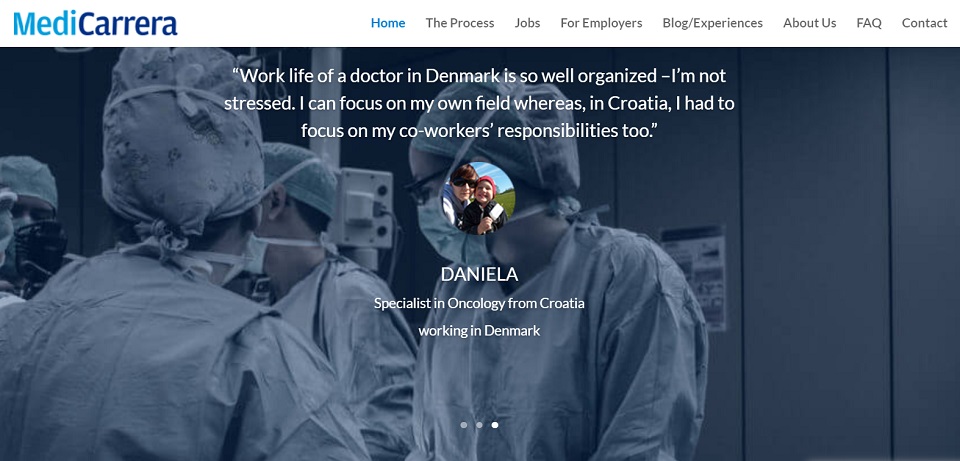
MediCarrera | Screenshot
Medical Staff Leaving Croatia: Remainers Working Unpaid Overtime
"After three and a half years of inaction, it is time to start treating chronic illnesses in the Croatian healthcare system. The system is in debt, irrationally organized, filled with red tape and waiting lists while doctors and other medical staff are leaving Croatia (for opportunities abroad). Those who remain, like nurses, are at a disadvantage and are being forced to work unpaid overtime hours,” Petrov pointed out.
Scandinavia Offers Croatians Free Relocation, Language Training, Child Care
Indeed, more financially prosperous EU countries have set up one-stop recruiting sites to lure medical professionals to their countries to the further detriment of Croatian citizens and residents. MediCarrera, a website serving the medical career recruitment needs of Denmark, Sweden and Norway; offers job placement, language training for hires and their families, accommodations and relocation costs; all of which are financed by employers in their respective countries.
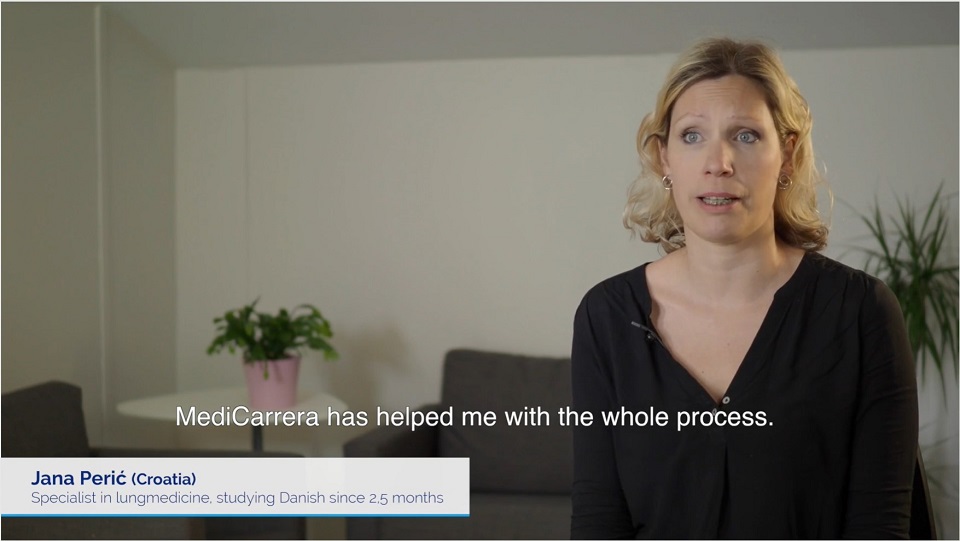
MediCarrera | Screenshot
Several Swedish media outlets have recently criticized Croatia for its demographic losses and emigration.
Despite these external and internal challenges, Petrov insisted to members of the Croatian government that Most would not let them continue policies of inaction which had defined the former health minister's term according to Index on February 14, 2020.
Croatians Have Highest Mortality Rate for Treatable Diseases
Strenja pointed out that Croatian citizens continue to occupy high, and sometimes the highest, mortality rates among all EU citizens for avoidable and treatable diseases.
The reason, she said, lies in the lack of effective preventive medicine, timely diagnosis and the timely beginning of treatment.
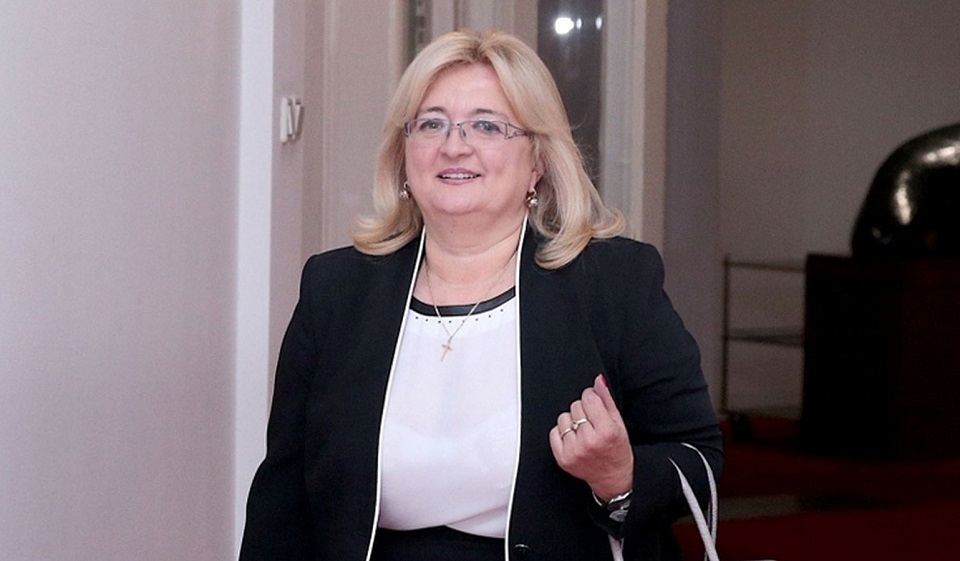
Ines Strenja | Most
Strenja: Investing in Preventative Medicine Yields Fourfold Savings
"Again, unrefined protocol, procedures, measures and responsibilities will continue to miss desired expectations, which is ultimately evident in the overall health data. We emphasize that the investment in preventive medicine is the best bet and yields fourfold savings in treatment," Strenje explained.
She added that ex-Minister Kujundžic's files contain proposals for national strategies that would lower the death rate in Croatia from preventable diseases which is currently 293 per 100 thousand inhabitants compared to 140 per 100 thousand in the EU. The mortality from treatable diseases in our country is 140 per 100 thousand compared to only 90 out of 100 thousand in the EU.
“Therefore, I am calling on the new Health Minister, Vili Beroš, to discharge them and move on to combat chronic non-communicable diseases and conditions in Croatia,” Strenja urged.

Ivan Bekavac | N1
Bekavac: Action Plan Another 'Wish List'
Ivan Bekavac, Advisor for Most’s Health Council, pointed out that two key documents should guide the future of Croatians: The Draft Proposal for the Prevention and Control of Chronic Non-Communicable Diseases 2020-2026 and the Draft National Cancer Plan 2020-2030.
"The Action Plan for the Prevention and Control off Chronic Noncommunicable Diseases 2020-2026 does not sufficiently emphasize the responsibility of the Croatian government for the health of the population, because it must place much greater emphasis on the coordination of all departments in promoting and preserving health. It is just a wish list of suggestions, and is almost identical to the previous action plan, and again lacks elements of supervision, monitoring, performance evaluation and research," he explained.
He also considers it a disadvantage that the Draft National Cancer Plan 2020-2030 omitted family medicine doctors who are most familiar with their patients, their habits and family heritage, and emphasized that they should be key stakeholders in encouraging and mobilizing patients for preventive examinations.
Follow our Politics page to keep updated on the health care crisis in Croatia.
Croatia EU Ambassador: 'Good Riddance' UK Becomes English School Billboard
“Good Riddance, UK!” After Irena Andrassy, Croatian ambassador to the EU, delivered her side-splitting parting statement to the UK; one English language school in Zagreb, Croatia used the ambassador’s English language fail to their advantage. She emitted the Freudian slip (?) while chairing the last meeting between the envoy of the United Kingdom and the European Union.
‘Good Riddance’ Becomes Croatia Ad Campaign
To widespread amusement, Andrassy told British Ambassador to the European Union Tim Barrow "Thank you, goodbye, and good riddance" which means "Thank you, goodbye, good to be rid of you", according to JutarnjiList on February 6, 2020.
The Američki institut (American Institute), a private English language school based in Zagreb, posted a photo of the new jumbo roadside billboard promoting the ambassador’s gaffe. The poster says: “Good riddance", and attributes those apparent no love lost parting words to the Croatian ambassador. The American Institute logo and message follow below along with the slogan: “Rid yourself of bad English”.
"Tree tousand young people" | Irena Andrassy
Croatia Ambassador Scrambles for Control of Runaway Gaffe
The Brexiting British and English speakers around the globe have enjoyed many laughs at Ambassador Andrassy's expense. After realizing the joke was on her, she rapidly responded in a Twitter post implying that her apparent gaffe was intentional, but that she was only kidding.
This isn’t the first time the American Institute has used the poor English skills of celebrities for its advertising campaigns. In 2017, the language school advertised English lessons with a photo of Melanie Trump on a roadside billboard: “Just imagine how far you can go with a little bit of English.”

First Lady Dispatched Legal Team to Threaten Language School
The First Lady of the United States was displeased with this representation of her considerable accomplishments and command of the English language. Through her legal team, the she demanded that the school remove the billboards within 24 hours or face severe legal consequences. The American Institute bowed to the demands of Trump's powerful legal team. However, because they had already leased the advertising space, they replaced the poster with another clever billboard; this time without Melania’s image.
On their Facebook page, the American Institute posted a photo of a new billboard with the caption “Take 2": “Invest in your English and billboards. People love a good billboard,” the new billboard sign advised.

Click here for more Total Croatia News articles on the First Lady, her accomplishments and English-speaking skills. Follow this link for TCN articles on prominent Croatians speaking English. Check out the Američki institut’s Facebook page for more amusing promotional imagery and an illustrated array of vocabulary builders.

Croatia Life Satisfaction: Second from Bottom of EU
“It’s a nice place to visit, but I wouldn’t want to live there,” so the saying goes, and that appears to apply to life for some in present-day Croatia. Recent research shows that Croats are extremely unhappy people.
As Gordan Duhaček/Index reveals on November 29, 2019; EUROSTAT has published data on life satisfaction in the European Union, and Croatia is again at the bottom of the chart. On the other hand, the citizens of Finland are most satisfied with their lives.
“Generally speaking; how satisfied are you with your life right now?" That is the question Eurostat asked thousands of Europeans in 2018, offering them the opportunity to answer on a scale from 0 ("not at all satisfied") to 10 ("completely satisfied"). The EU average in terms of satisfaction with one's life for 2018 is 7.3, which is a 0.3-point increase over 2013, when the survey began.
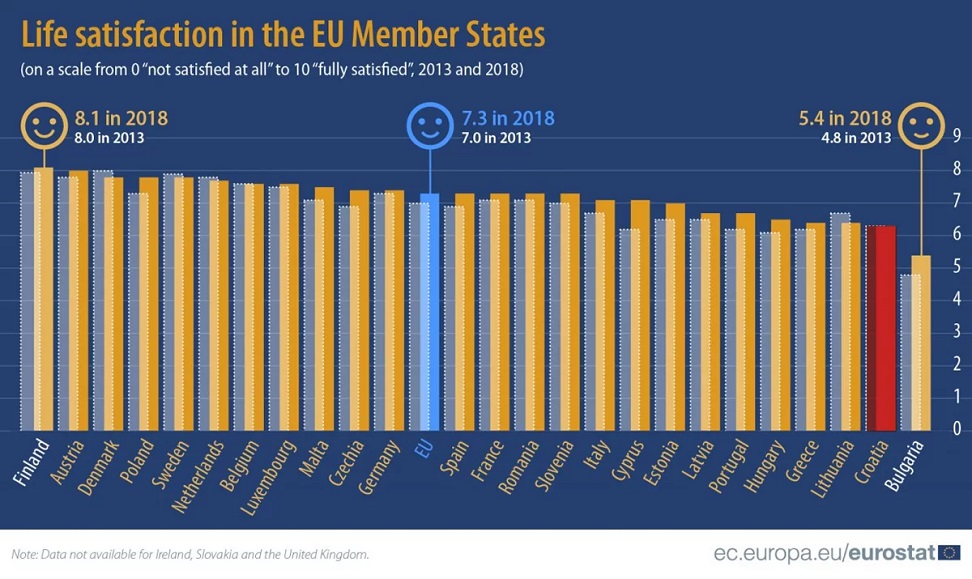
EU Life Satisfaction Increase
In five years, satisfaction with one's own financial situation has increased (in 2013 the average was 6, and in 2018 it was 6.5), as well as satisfaction with personal relationships (in 2013 the average was 7.8 and now 7.9).
But a more complex picture emerges by reviewing results across European Union countries. Finns rated their life satisfaction an impressive 8.1, while Bulgarians, who are least satisfied with their lives, gave their life satisfaction a 5.4 rating. Croats are second from the bottom of the rankings, with a reported life satisfaction rating of 6.3, which is below the EU average.
Lithuania, Greece, Hungary, Portugal, Latvia, Estonia, Cyprus, Italy, Slovenia, Romania, France and Spain all reported below-average ratings, while the Finns, Austrians, Danes, Poles, Swedes and Dutch are most satisfied with their lives.
From 2013 to 2018, life satisfaction increased among citizens of all 19 EU Member States, with Cyprus, Bulgaria and the Czech Republic enjoying the largest leap. And although Bulgarians are the least satisfied with their lives of all EU member states, they have grown more satisfied in the past five years. However, the same cannot be said for Croats.
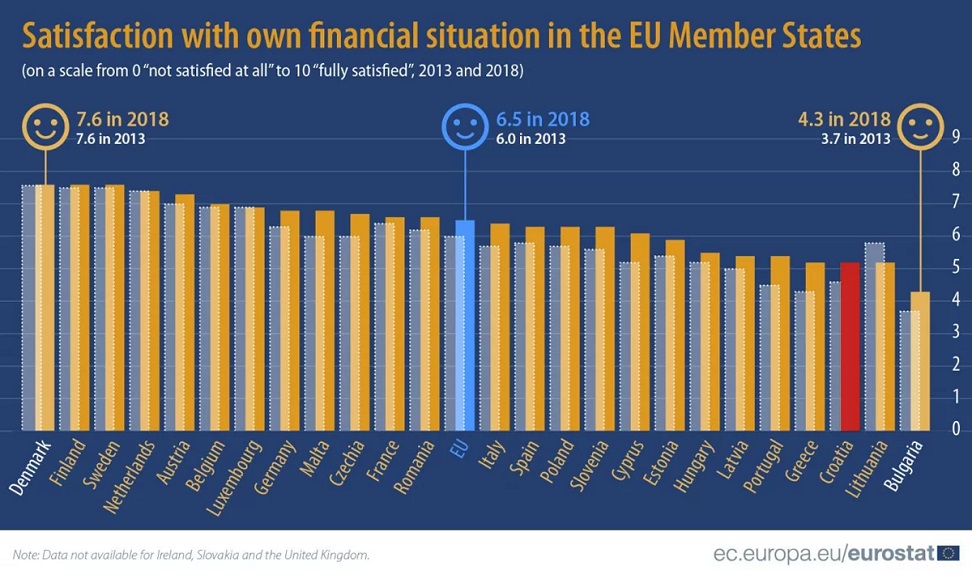
Croatia Not Satisfied
Specifically, Croats were equally (un) satisfied with their lives in 2013 and 2018, and only Belgians expressed the same level of satisfaction, but their satisfaction level is significantly above that of Croatia. Interestingly, in 2018, only four EU Member States performed worse, namely Lithuania (-0.3), Denmark (-0.2), the Netherlands (-0.1) and Sweden (-0.1). However, it shouldn’t be assumed that Lithuanians and the Dutch are equally dissatisfied, given that Lithuania is at the bottom of the ladder and the Netherlands is at the top. In other words, the decline in life satisfaction in the Netherlands by 0.2 percent is almost negligible, while the overall poor positioning of Lithuania is a much bigger challenge for its citizens.
Croats are also among the least satisfied with their financial situation (only Bulgarians and Lithuanians submitted worse ratings) and are well below the EU average, which garnered a 6.5 rating on a scale from 1 to 10 in 2018. Croats, however, rated their financial satisfaction at 5.1.
Citizens of Denmark, Finland and Sweden are most satisfied with their financial situation, with the largest increases in financial satisfaction from 2013 to 2018 were reported in Greece, Cyprus, Portugal, the Czech Republic, Italy and Slovenia.
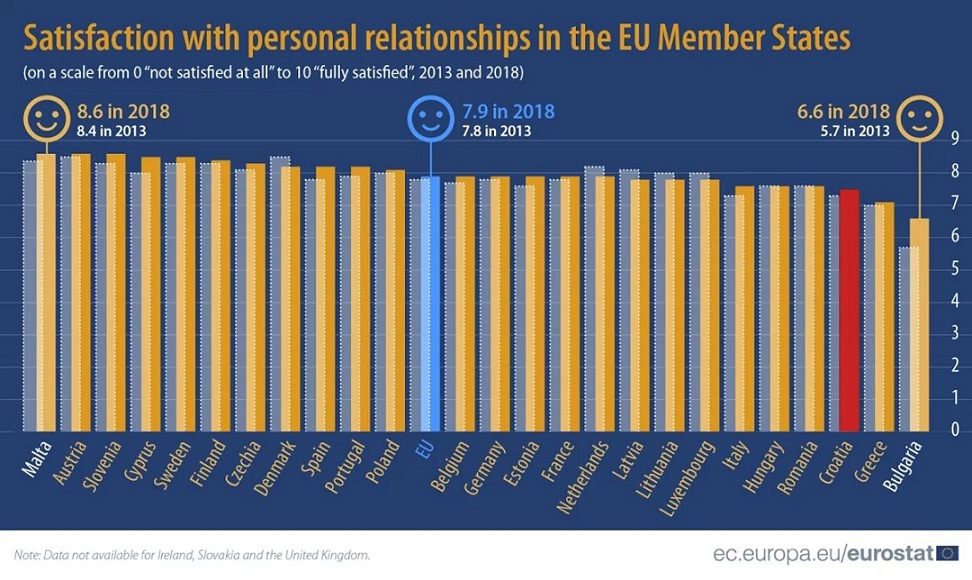
Croatian Relationships Lacking
The results in the category of personal relationships are particularly interesting. Malta is most satisfied (8.6 rating), followed by Austria, Slovenia, Cyprus and Sweden. This suggests that satisfaction with financial situation is not crucial to fostering good interpersonal relationships.
The Croats are at the bottom again, unfortunately. Only Bulgarians (6.6) and Greeks (7.1) are more dissatisfied with their personal relationships, while Croats with a score of 7.5, are now third in the EU. It is worth noting that this rating is only slightly higher than 2013, which suggests that Croats should be working on their interpersonal relationships.
In any case, Eurostat has demonstrated what some of us experience every day: Croats are a deeply dissatisfied nation, both in their lives and in their relationships with other people.
A detailed article is available on the Eurostat website here. For more information on life in Croatia, follow our Lifestyle page here.


